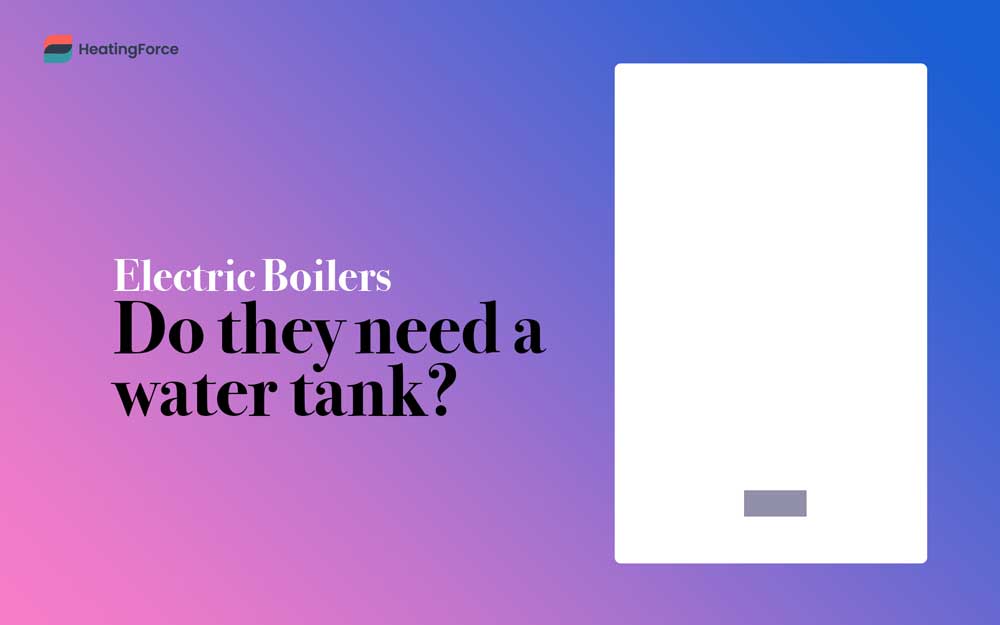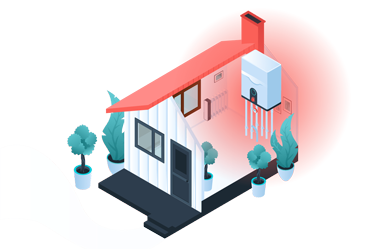How to Replace an Immersion Heater With an Electric Hot Water Boiler
If you are looking to replace an immersion heater with an electric boiler, you’re in the right place. In this guide, we will explain different electric water boiler types, and whether your replacement boiler needs a hot water tank.

Unlike an immersion heater, an electric water boiler can serve both your central heating and hot water needs (unless you need an electric boiler for hot water only). What’s more, a combi boiler removes your need for a water tank, saving you precious space and leaving you with one less part to fix and maintain.
But in some homes, the hot water and wet central heating system are set up with a hot water tank; if you have an immersion heater, you definitely have a hot water tank on your property.
So, are you able to replace your immersion heater with an electric combi boiler, thus removing the need for a water storage tank and consolidating your hot water and heating systems?
The short answer — like with any oil or gas boiler, it depends on the type of electric boiler you buy. In this guide, we will explain which electric boilers need a water tank and which don’t.
Different Electric Hot Water Boiler Types
Just like gas and oil boilers, there is a variety of electric water boiler types to suit different properties. Some of these boiler types require a water tank and some don’t, so here is a quick run-down of the most common variants.
Direct Electric Boiler
A direct electric water boiler is the equivalent of a combi boiler. It uses a heating element to heat cold water on demand and so has no need for a hot water tank. This makes it simpler and cheaper to buy and install, but means that you can’t take advantage of Economy 7 tariffs by heating water overnight for use during the day.
Also, an electric combi boiler may not suffice if you have high hot water demand.
Storage Electric Boiler
As the name suggests, a storage electric water boiler does require a water tank, either within the unit of separately. If you replace your immersion heater with this electric water boiler type, you’ll be able to take advantage of cheaper overnight electricity costs to heat and store hot water. Also, you’ll have more hot water at your disposal — perfect for fast filling baths and running multiple taps at the same time. However, these boilers are also bigger and cost more.
Electric Flow Boiler
Electric flow boilers are typically single phase boilers that can be configured to supply heat only, with no water storage tank, or both heat and domestic hot water with a tank. These boilers are generally low-cost, compact, and easy to install, and their versatility is a definite advantage.
Electric CPSU Boiler
A Combined Primary Storage Unit (CPSU) stores a lot of hot water within the boiler itself; this way, the boiler can meet higher demands and provide water at a higher pressure. This type of electric boiler comes with a water tank in the unit but is usually only available commercially.
Dry Core Storage Electric Boiler
Dry core electric boilers use cheaper nighttime electricity tariffs to heat bricks. This heat is then released into water during the day to provide hot water and central heating. They work much like storage heaters.
Solar Compatible Electric Boiler
If you want to power your boiler with renewable technology such as solar panels, you can do so, but this type of electric water boiler will need a storage tank with an immersion heater. So, you’ll be adding the boiler instead of replacing the immersion heater.
Which Type of Electric Boiler is Right For You?
Deciding which of these electric hot water boiler types is the right type for your property will depend on various factors.
A direct electric boiler is typically better suited for smaller homes with fewer radiators and less hot water demand. If you have multiple bathrooms and more people using hot water, you’ll likely need a storage electric water boiler to meet your demands.
If you have solar panels or are planning to install them, a solar compatible boiler is a good choice. That said, you should check with your installation company to make sure you’re buying the right-sized boiler before you pay.
Why Choose an Electric Water Boiler
If you’re thinking of replacing an immersion heater with a boiler, you may wonder whether to get a gas boiler or an electric one. So, what other benefits are there to choosing an electric water boiler? Here is a run-down of the most notable advantages:
- Low Installation costs – While an electric water boiler costs roughly the same as a gas or oil-powered boiler, it is generally much easier to install. This means the boiler installation costs are much lower.
- Reliability – Electric boilers have a simpler design and the absence of a physical fuel means there is far less that can go wrong. As a result, they tend to be much more reliable and cost you less in maintenance and repair.
- Low Carbon Emissions – Electric boilers have an extremely low carbon footprint, meaning your home will be much greener.
- Energy Efficiency – Electric boilers have an energy efficiency rating of around 99%. This means you waste less fuel and save money on energy bills.
- No Noise – Electric boilers make little or no noise, which is great, especially in a smaller home.
- Location – Electric boilers don’t need a flue to get rid of toxic gases. This means you can install them anywhere in your property.
- Size – Fewer moving parts mean electric boilers can be much smaller than gas or oil boilers, especially if you choose a type with no water tank. As a result, you can install them in a standard domestic airing cupboard, under the stairs, or anywhere else you like.
The Main Disadvantage of an Electric Hot Water Boiler
The key disadvantage of choosing an electric boiler are the running costs.
Electricity is generally between two and three times as expensive as gas or oil. But as we have explained in our guide on the running costs of an electric boiler, this doesn’t necessarily mean an electric boiler costs two or three times as much to run.
There are many costs to running a gas or oil boiler that you don’t have with an electric boiler and, crucially, it also consumes around half as much ‘fuel’ as a gas or oil-powered boiler. This makes the costs comparable overall, or slightly higher at worst.
However, if you’re not ready for an electric boiler, modern gas boilers are quite energy-efficient, and are still a good alternative. In fact they’re a great alternative to oil boilers, which emit more CO2 and require an oil tank. If you’d like to see your replacement options, we’d suggest you check out Heatable — they’re an online boiler installation company with tonnes of special offers on top boiler brands like Worcester and Viessmann. Just fill in their 90-second, anonymous survey, and you’ll get a range of fixed price boiler quotes on your screen.
Summary
In this guide, we walked you through the different types of electric boilers, talked about the pros of choosing an electric boiler, and explained the one major downside. Hopefully, this post will help you decide if you should replace your immerision heater with an electric boiler.
Have you ever had an electric boiler in your home? How did it work for you?
If you have any questions or experiences you’d like to share, please leave a comment in the box at the bottom of this page. We will try to respond to all comments as fast as we can.
